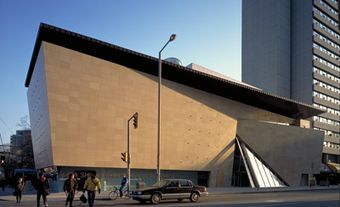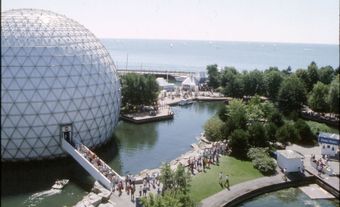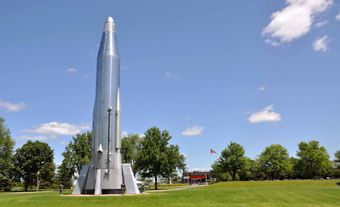The Ontario Science Centre opened in 1969 with the purpose of exhibiting and conducting public education programs about science and technology. Since its opening, the Centre has been recognized for its hands-on or “learn-through-play” approach to exhibition and educational programming. In 2023, the Ontario government announced that the Centre would move from its original Don Valley location in Toronto to a new site in Ontario Place. In the summer of 2024, the Don Valley site was closed to visitors due to deteriorating infrastructure.
History
The Ontario Science Centre was originally known as the Centennial Centre of Science and Technology. Plans for the Centre were first announced by Premier John Robarts in 1964 as one of Ontario’s projects for the Canadian Centennial (see Confederation; Canada’s Centennial Celebrations, 1967). The Don Valley in Toronto was selected as the location for the new facility, and the architect Raymond Moriyama was commissioned to design the Centre. The project was funded both provincially and with a federal grant. Construction costs and initial exhibit development amounted to approximately $30 million dollars. The Centre opened in 1969, two years later than anticipated. Despite the delayed opening, the Centre’s architecture and exhibitions were met with enthusiasm from visitors. News articles reporting on the Centre’s opening highlighted the participatory and hands-on quality of exhibitions displays. Over the years, the Centre’s staff, plus students, have built numerous interactive exhibits in disciplines ranging from earth sciences to chemistry, and technology to human biology.
Ontario Science Centre Sketch
Sketch of the Ontario Science Centre, 27 April 1965.
(Photo by Reg Innell/Toronto Star via Getty Images)
In December 1996, the Centre opened the OMNIMAX Theatre (a 24-metre domed screen theatre and the only IMAX dome screen in Ontario). (See also IMAX Systems Corporation.)
Beginning in 2003, the Centre embarked on a five-year $47.5 million renewal project, called Agents of Change. Funded by the Ontario government and the private sector, the project revitalized the Centre’s outdoor and indoor spaces. The project included the creation of the Weston Family Innovation Centre, the TELUSCAPE plaza, art installations and the expansion KidSpark, a hands-on exhibition space.
Operations
Ontario Science Centre Display
Misha Rosolak plays with a display from the show Mindworks at the Ontario Science Centre, 26 March 1991.
(Photo by Al Dunlop/Toronto Star via Getty Images)
Since its opening, the Ontario Science Centre has welcomed more than 54 million visitors. The Centre has run a successful science school that gives credit to up to 36 senior high-school students, who attend for one semester. Among other countries, Britain, the United States, France, China, Japan, Malaysia and South Africa have purchased exhibits and rented exhibitions from the Centre. To meet this demand the centre manufactures and rents copies of its exhibits to museums and science centres around the world and in Canada.
Did you know?
During the COVID-19 pandemic, the Ontario Science Centre began to offer virtual school programs and learning activities.
The Centre reports to Ontario’s Minister of Tourism, Culture and Sport and through the Minister, to the Legislative Assembly of Ontario. The Centre is also governed by a board of trustees who are appointed by the Lieutenant Governor in Council. For the 2022-23 fiscal year, the Centre earned total revenues of $38.5 million and incurred expenditures of $38.1 million. It receives an operating grant of approximately $19 million from the Ontario government with other revenue provided primarily from admissions, sponsorships and sales and rentals of exhibits.
Relocation and Closure
In 2023, the Ontario government announced that the Ontario Science Centre would be relocated to Ontario Place, a tourist attraction located in Toronto near Lake Ontario. Construction for the new Ontario Science Centre is anticipated to begin in 2025, with the new Centre opening in 2028.
On 21 June 2024, the Ministry of Infrastructure announced that the Centre’s Don Valley site would be closed to the public due to structural issues. The Ministry cited an engineering report by Rimkus Consulting Group, which identified problems with the reinforced autoclaved aerated concrete (RAAC) used in the roof panels of the Centre’s three buildings. The report also provided recommendations for repairs. The Centre’s board of trustees voted to close the Centre following the report.
The relocation of the Centre to Ontario Place as well as the Centre’s 2024 closure was met with criticism and opposition from members of the public, engineers and Moriyama Teshima Architects (MTA), the firm of the late architect Raymond Moriyama. In a 2023 public statement, MTA advocated for “preserving and regenerating” buildings like the Science Centre to reduce carbon cost and enhance the heritage, architecture and relevance of public institutions. In a 2024 statement, the firm responded to the Rimkus engineering report and offered MTA’s services free of charge to realize recommended repairs.
On 11 July 2024, a peer review of the Rimkus engineering report was released by VanBoxmeer & Stranges Engineering Ltd. (VB&S). The report confirmed the findings and recommended repairs originally suggested by Rimkus. Critics oppose the decision to keep the Centre closed and to not invest into repairs.
A search for an interim location for the Ontario Science Centre is ongoing.

 Share on Facebook
Share on Facebook Share on X
Share on X Share by Email
Share by Email Share on Google Classroom
Share on Google Classroom












